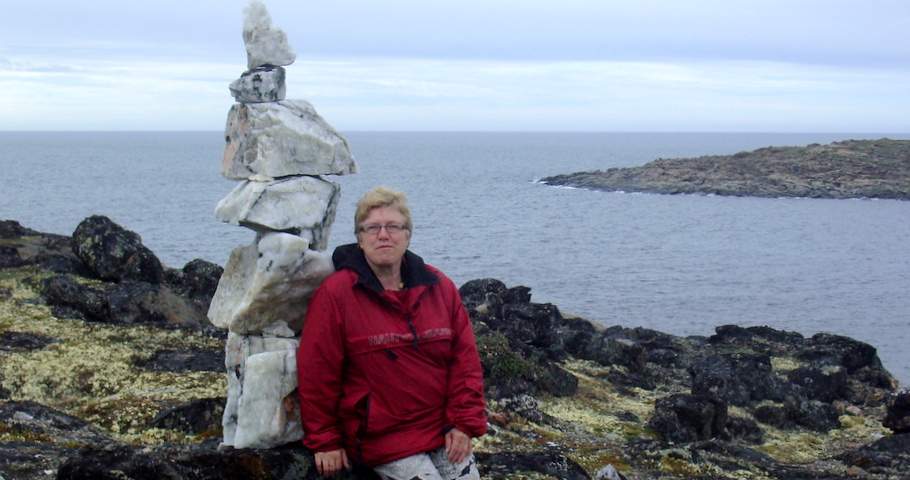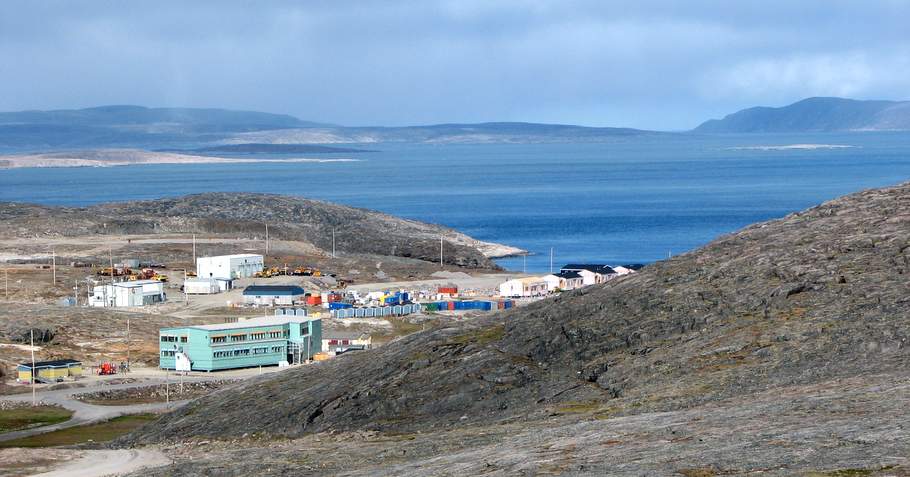No Child Should Have to Take the Long Way Home is a grassroot initiative to help children in need of loving care, of a protective and stable environment to meet their basic needs for protection, shelter and education in a safe house in their own community.
 Children, mothers and communities are the object of this project No Child Should Have to Take the Long Way Home. After all, every child is born
with the right to have a better chance at a life free from abuse and violence. Children belong to their community. When they are removed not only from their families, but from their community, children lose out on being raised by their own families, in their own communities. As a result, there are increased numbers of Inuit children in child and foster care.
Children, mothers and communities are the object of this project No Child Should Have to Take the Long Way Home. After all, every child is born
with the right to have a better chance at a life free from abuse and violence. Children belong to their community. When they are removed not only from their families, but from their community, children lose out on being raised by their own families, in their own communities. As a result, there are increased numbers of Inuit children in child and foster care. Following the conference at Amnesty International, the group allowed me to name them as support.
The director of the Villa Pierrot, Lise Cadieux, gave her personal endorsement to help me file for the foundation Lorraine Loranger: a consultation with her CA will or will not allow the logo on my blog.
A visit to the Mayor of Magog, Quebec, Vicki May Hamm opened doors for me to the Quebec Federation of Municipalities. She is to facilitate certain contacts with town decision-makers.
The Municipality of North Hatley and of Ste Catherine de Hatley, their mayors, Jacques Demers and Michael Page (July 6th 2015-08-06-Resolution no. 2015-07-104) lent me a conference room on request for conferences and exhibition.
A group of women invited by Sylvie Plamondon, greeted me at Valcourt CSSS to deliver my testimony related to my experience in the Far North. A small group within the same group volunteered to knit mittens and scarves to raise money for my project.
I was invited in a private home to deliver a testimony of my experience in the North.
The mayor of Elliot Lake, Ontario, Dan Marchisella, greeted me warmly and will promote my progress on the Facebook site of the Town Hall. He gave me encouragement and I am to keep in touch with him.
The mayor of Sudbury, Dan Bigger, allowed me to meet his team of collaborators with my one-time social media advisor, Barbara Lavoie. We had a chance to visit his city with Tourism Sudbury.
In the week of August 10th 2015, I met two other mayors: Mayor Al MacDonald in North Bay and Mayor Jim Watson in Ottawa.
I also met up with SOS Village director Boyd McBride to talk about a model of child care.
For a few weeks in late August and early September, I was sponsored by two families for meals and accommodation while I was waiting for mayors' answers to my request.
In late September, I met with the Mayor of Earlton, Ontario, Robert Éthier and his wife Annete, who willingly gave me informations and names of people I will contact to further refine my project.
In October, I met the mayor of Rivière-du-Loup who shared his knowledge of situations he knew about in the North.
On Novembre 11th, 2015, the mayor of Granby, Pascal Bonin, promises to have an article written in the Voix de l'Est when I come through his town.
On Novembre 24th, 2015, a 3rd meeting with the mayor of Magog assures me of her unconditional support.
The mayor of Rivière-du-Loup, Gaëtan Gamache, know a lot of people who are involved in the North of the 49th parallel.
The mayor of Granby, Pascal Bonin, promises me an article in the Voice of the East during my journey in his city.
In November 2015, in view of the actions for the women living with violence, my meeting with 10 women at the Center of women in Memphremagog enabled me to tell them what I saw with my eyes, but even with my heart. During my walk, they can follow me on my blog.
In December 2015, I met with the director of Aura Freedom International in Ontario. Their direct involvement with women and solutions for women who struggle to be free from oppression and to obtain an education is a route to explore fully. Financial support for a study needs to be confirmed in early January 2016.
Meetings and activities about and for women and children in 2016
- Mary Ellen Turpel Lafond as BC’s representative for children in care from 2007 to 2016, whom I met at a CUPE event (Vancouver).- Indigenous Women’s Forum on Racism (Duncan)
- Cowichan Tribes Lalum’utul’ Smun’eem Child and Family Services (Duncan);
- Cowichan Women against Violence Society (Duncan)
Meetings for Reconciliation and Truth
- Participation at Baha’s (Duncan)- Conference at Seaside Yoga Studio (Chemainus)
- June Aboriginal Day celebrations in (Chemainus)
- Participation at Duncan’s Library-The fabrication of a dreamcatcher given by a Coast Salish woman (Duncan)
- A Matter of Attachment to the Culture to Save Young Lives at Risk (Nanaimo)
Meetings for Mothers and Children
- SOS Children’s Village (Surrey)- Aboriginal Mothers Center Society, (Vancouver):
- Pacific Association of First Nation’s Women (Vancouver);
- Villa Pierrot-(Magog, Quebec).
- Friendship House Association (Prince Rupert):
- Lillooet Friendship Center Society (Lilliooet):
- Williams Lake Transition Home (Williams Lake):
- Vancouver Friendship Center Society (Vancouver):
- Media conversation and interviews;
- Participation at NVIT painting workshop (Merritt).
- Visits of five Friendship Centers
- Participation in Amnesty International activities on October 4th, 2016 (Ottawa);
- Particpation at Magog book club to talk about my project.
- Invitation at a supper with the purpose of talking about my project.
A Matter of Attachment to the Culture to Save Young Lives at Risk
Reading and hearing Nanaimo’s Snuneymuxw First Nation members talk about suicide, an issue that was rampant in that community five years ago was a reminder of shocking statistics in our most northern communities. The apparent success of their cultural revitalization program may tempt health workers and policy makers to study the features of their program and attempt to replicate it in other Aboriginal communities.Housing and Alternative Shelters serving the purpose of housing and education
Housing is a factor that influences health. Housing is also a visible dimension of poverty and vulnerability. Women and children are bearing the brunt of this situation. Real change concerning this reality needs to be systemic. Often seen as being solely responsible for the safety and protection of their children, Inuit women have difficulty fulfilling their parental role in an overcrowded home where the harms of substance abuse and alcohol abuse are the obvious symptoms of the communities’ distress.Children at risk
a) SOS Children Village in Surrey, the only one in Canada, is a non-profit home to many of the most at risk youths of BC since 1999. The Vancouver Aboriginal Agency wanted to stay true to their culture so they contracted SOS Children’s Village for the Aboriginal children needing such a safe facility.Mothers and Children at risk
This facility of 16 housing units draws on its traditional First Nations culture to move mothers and children at risk on the streets of Vancouver and surroundings. The organization claims that they empower aboriginal mothers to transform their lives. Tools, resources, support are offered to the mothers to help them regain their health, self-esteem and give them skills in order to regain and retain their children. Set in a grassroots environment to create a healing community, it provides nurture to both children and moms.
c) Villa Pierrot-Magog, Quebec
Since 2009, Villa Pierrot, with partnerships from the community of Magog, Quebec, offers 21 apartments for single mothers with children under the age of 5 who are over 18 years old and having difficulties such as mental health, family violence, etc.…
Villa Pierrot offers housing, child care services, community life and hope…to get out of poverty and to facilitate education. Volunteers support the child care services to aid the mothers and help them gain access to a better life and better outcomes for their children.
The women go through a process of choosing the objectives they want to concentrate on as they extend their stay at the Villa, whether it is three or five years. They can participate in different committees to learn the process of decision-making and at the level of citizenship, they must engage in giving what they have received. It is not the size of the step that is important but that they are willing to expand, however small the step.
Extended services
Friendship House Association of Prince Rupert:Friendship House Association of Prince Rupert is an inclusive organization that exists to provide programs and services to the community at large; there is an emphasis on the needs of the First Nations People in the areas of education, culture, health and recreation.
Lillooet Friendship Center Society:
In Lillooet, the Friendship Centre Society has grown to be a leading employer in the community, the largest social service organization, and it generates approximately 1.8 million dollars in revenue to the community.
Williams Lake Transition Home:
Located in the heart of the Cariboo, this 16 bed unit provides a haven for women and children as well as counselling and workshops on domestic violence, a part of its community outreach program.
Vancouver Friendship Center Society:
Located on HastingsStreet in the heart of the city of Vancouver, it has a huge urban Aboriginal membership. The different amenities have a positive influence on health, education, social life bringing a sense of confidence and empowerment to the urban poor.
Through its advocacy work, Vancouver friendship Society is also able to influence policy changes at several levels.
Women are given information and guidance. For many women, access to services, from transportation to affordable food helps to maintain some control over their lives.
Conayt Friendship Society:
Conayt means "helping others". In keeping with this philosophy, Conayt has built a community image to improve holistically the quality of life, cultural distinctiveness, and strengthening friendship and cooperation between the Aboriginal and Non-Aboriginal members in their community in the Nicola Valley to serve the growing population of urban Aboriginal people.
In June of 1975, the Province of British Columbia recognized the Nicola Valley Friendship and Counselling Society as a non-profit community based organization. Since 1983, the newly baptised Conayt Friendship Society is now located at 2164 Quilchena Ave. in Merritt, BC.
Momentous meetings
Representative of BC children from 2007 to 2016Mary Ellen Turpel Lafond came to my attention in late 2007 as I was preparing to work as a youth protection agent in Nunavik. Her work has been essential to change our world. As a member of the Muskeg Lake Cree Nation, she knows firsthand the challenges of the First Nations populations. While working as BC’s representative for children in care from 2007 to 2016, with her huge vision and ambition, she developed a small, efficient organization to improve children’s outcomes in BC.
Dedicated people like Mary Ellen Turpel Lafond and Cindy Blackstock (whom I will meet in another province) will not give up until they have spread their ideas and corrected functions and situations. Mary Ellen Turpel Lafond’s last report is lucid and informative.
Sexual exploitation and risks of being lured and trapped into prostitution for hire is already happening in Nunavik.Trafficking is a real risk for young women and babies in the North.
Mary Ellen Turpel Lafond’s work is an inspiration and her strong message reaches me at a deep level.
Indigenous Women’s Forum on Racism "Let Me Speak...Stop Racism"
(National Coverage by Shaw TV)
Some individuals have fixed determination and indomitable will to try to shift behavior patterns and perceptions. Such was the work of Salish Coast woman Sharon Tzouhalem as she organized an Indigenous Women’s Forum on racism.
Many implications follow from participating in such an event. Around the world, people are encountering similar problems of racism.
In Canada, inadequate education, health inequalities, environmental threats, declining trust in political institutions, entrenched poverty, high crime rates keep First Nations people down.
Racism, as a consequence of patriarchy, especially in the justice system, continues to limit the future outcomes of First Nations and Inuit mothers and their children.
Women have to renew their struggle to fight whatever is “normalizing” inequalities that have a direct impact on how the women fare. Different organizations require special efforts to provide support for women who tend not to have access to “equal” treatment because of the patriarchal principles in law.
Cowichan Women against Violence Society
Sharing with executive director of Cowichan Women against Violence Society, I advocated for Inuit women and children. In solidarity with any woman who is in an abusive relationship, I volunteered to work at Cowichan Women against Violence Society. It allowed me to get what it is to have a safe, healthy and vibrant community and on the how to get there.
In the Cowichan Valley of Vancouver Island, Cowichan Women against Violence Society has been researching safety issues and developing planning policies that counter these issues and encourage the use of women’s safety audits as a tool for assessing proposed community developments.
The Safer Futures program believes that building community health and safety requires comprehensive efforts that promote equitable opportunities for a good quality of life and narrow the gaps between the advantaged and disadvantaged, this, to ensure healthier children, stronger families and more cohesive communities.
Meetings and Activities for Reconciliation and Truth – Education is key
Presentation on Earth Day at Lilloett Friendship Center Society on the Inuit Women’s situation which prompted my walk. Petition signed.
……………………………
Conference on the subject of Inuit women’s treatment in Family Court to the general population in the town of Chemainus and what happens to children in the process.
……………………………
Conference, signing the petition. An impromptu invitation to a Baha movement promoting Reconciliation and Truth gave me an opportunity to share my project and make a request regarding the sharing of the project No Child Should Have to Take the Long Way Home. Many came forward to sign the petition I carry with me.
……………………………..
A phone conversation on the subject of Reconciliation and Truth with Bishop Logan Mc Manamie of Christ Church Cathedral of Victoria focused on what it means to decolonize oneself. The decolonized thinking championed by the Bishop aligns with a movement around the world that recognizes and celebrates the rights of First Nations.
………………………………
An invitation to supper in the elders’ room by an elder (Angela Underwood) of the Cowichan Tribes following meeting with Amanda Redpath, Child Safely Manager at Lalum’utul Smun’eem Child and Family Services led to understanding that working on the safety of our most sacred beings-our children-is a calling.
………………………………
Participation to the picnic of Cowichan Women Against Violence the general assembly.
……………………………….
Meeting Georgia Collins, NDP candidate to talk about environmental concerns is a way to connect about other vital issues to Aboriginal constituents.
………………………………
June 21st activities starts with listening to a First Nations Elder at the Wheel Park in Chemainus. Participation in dances and songs.
Participating in an activity of Duncan’s Library. An opportunity arises to speak to the library director, Melanie Reavely; as well, dreamcatcher workshop participants about my walk project for the Inuit women and children.
…………………………….
An interview with Dolores, a child placed in a white foster home, led me to understand what it is to be cut off from one’s culture. The interview took place at Chilliwack Library.
……………………………..
On my way to a radio interview, I stopped to visit the Conayt Friendship Center in Merritt, met a grandmother whose wards were her four grandchildren to make sure they stayed close to home.
……………………………..
My presence at the Memphremagog Book Club allows me to give a byline of my project and the walk.
…………………………….
On the occasion of my presence in Quebec City, I gave a sketchy feedback about my walk, the people I have met and my results to a ranking member of Saturviit.
Momentous meetings in BC to validate my project as a Canadian concern
It was important for me to validate my project as a Canadian concern for all the reasons I have evoked before. The people below work steadfastedly in changing things for either children or mothers. They are instrumental in making sure that those two vulnerable populations who are impacted by their life conditions get improved services and programs. Their perspectives will certainly help in changing policies and practices in the areas of child and family work in BC.Mary Ellen Turpel Lafond (BC advocate and child representative)
BC MLA Melanie Mark
Fostering Change (Vancouver Foundation)
Pacific Post-Partum Support Society
Kamloops-assistant mayor Tina Lange (Changes in the treatment of justice)
Community involvement and volunteers
In every community I visited, I found people who work hard to lay a different foundation for our society.When I started walking, I half expected to be joined by many walkers. The reality was that I had to enroll each group or individual to walk with me but I came to the realization that whatever support I obtained mostly stayed away from the highways that stretched in front of me.







No comments:
Post a Comment